A synthesis on the Russia-Ukraine situation
If you’re already subscribed, thank you! If you’d like to subscribe, please do so here:
YouTube and podcast will be up tomorrow!
Brought to you by AssetDash
Stop checking multiple investment accounts and crypto wallets, and track everything in one place with AssetDash. AssetDash supports everything from NFTs to DeFi to stocks and more. It also supports every major crypto exchange, brokerage, blockchain, and crypto wallet. You can receive notifications and insights about your investments and more.
It was voted #1 Product on Product Hunt.
If that sounds useful to you, check out the app here: https://linktr.ee/assetdash
*This is not investment advice.
What’s going on?
I want to begin by clarifying two things
I am a synthesizer of information - all of the information below is a conglomeration of other’s thoughts on the situation
My goal is always to maximize signal-to-noise
I’ve covered this extensively on my YouTube with Ben (since November 2021)
Synthesis
So here is a synthesis of everything that has happened and everything that might happen, based on the opinions and analysis of many people who have been covering this for a long time. I will include a link to my Notion doc which I will update as this situation is rapidly evolving, but this is background + up-until-this-point for those who might be seeking that.
Here is a brief infographic that ties into what seems (always a bit subjective) to be some of the most important themes, which I will walk through.
Brief Overview
What is going on?
Some history - as Putin made very clear in his speech yesterday, Ukraine used to be a part of the USSR - which no longer exists. However, Ukraine had a pro-Russian leader until the 2014 Ukranian Revolution - when the Ukrainian people protested, overthrew the government, and signed the EU Association agreement that Yanukovych refused to sign. After the revolution, Putin annexed Crimea, along with the continuous, ongoing conflict in the Donbas. All of this led to years of violence and economic pain for Russia (the Russian Financial Crisis - you can’t just annex countries) - but Putin still wants Ukraine.
He wrote a piece back in July 2021 called “On the Historical Unity of Russians and Ukrainians” where he makes it very clear how he sees Ukraine and Russia’s relationship (a subservient one where Ukraine belongs to Russia).
Putin sees himself as the Ultimate Unifier of Everything, and the wants to restore history to the present. As the CEA wrote “Vladimir 2.0 (Putin) has inherited Vladimir 1.0’s mantle as the divinely mandated protector of all Russian-speakers”.
Putin has made his plan for Ukraine (and beyond) very clear - chasing this ultimate goal of reuniting the Russian empire. He is attempting a form of Kremlin Imperialism, under the guise of returning countries back to “where they belong” (hence his long history lesson yesterday around the history of Russia).
And this makes sense, right? Back in 2005, he called the break up of the Soviet Union “the greatest geopolitical catastrophe of the century”. So now, his goal? To resolve the greatest geopolitical catastrophe of the century, and to return Russia to being a global superpower. But why?
Putin’s Stance
Putin does not like NATO - A lot of his worries stem from Western assimilation and the enroaching power of NATO. He wants Moscow to have a sphere of influence, and feels like the U.S. always steps on them, for no reason.
NATO: He does not like the idea of NATO being on Russia’s borders. He expressed frustration towards Bill Clinton for not letting Russia into NATO back in the 1990s - making it clear that his anger was not only a response to 1) not being let in the club but also 2) opposition to the Western sphere of influence.
Western Assimilation: He also doesn’t like that countries are beginning to align to the West - Ukraine joining NATO is not an option, in his eyes.
He stated that any form of assimilation from the West would be akin to weapons of mass destruction - “It would not be an exaggeration to say that the path of forced assimilation, the formation of an ethnically pure Ukrainian state, aggressive towards Russia, is comparable in consequences to the use of weapons of mass destruction against us.”
Which is pretty strong wording
Putin wants Ukraine “back”
Ukraine is not a country, in his eyes: He gave an ultimatum that basically boiled down to “Russia will back down when Ukraine gives up sovereignty” requiring them to recognize 1) Crimea as Russia, 2) demanding that they do not join NATO, and 3) that they are demilitarized
But of course, it’s more than that. The big problem is that Putin wants more than just Ukraine. Ukraine is likely just the beginning.
So. That’s the situation, arguably very oversimplified. He wants Kremlin Imperialism. Now, things have reached a bit of a boiling point. Information warfare is meeting economic sanctions and political posturing.
For the past several months, Russian troops have been aggregating along the border in Ukraine, carrying fuel and live munitions, lots of planes flying around, shelling, a lack of de-escalation, cyberattacks, and much more.
For a while, it’s been the ability to fight without *really* firing. But things are escalating - the game of disinformation and propaganda isn’t really going to work the same way, and Putin seems to have realized that.
Propaganda and Disinformation
If you watch RT on YouTube for a long enough amount of time, you get a pretty good sense at the level of propaganda that goes into this. There is a lot of “Putin only wants to protect” and “Ukranian people want this” both of which are highly questionable. But the Russian information machine is a very powerful wartime tool.
And this ties into the broader political/information warfare that we have going on. Putin has perfected some aspects of this. It’s a combination of disinformation, both covert and overt as outlined below, as well as active measures to disarm those that you are trying to destroy.
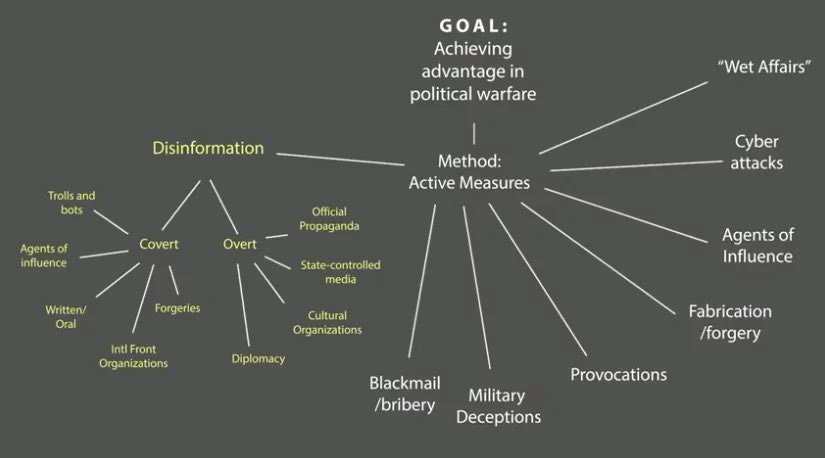
This is what Russia has largely done - through warfare posturing, troop positioning, taking spots in Belarus, and through cyberwarfare.
Disinformation: Anything from Russia TV to the constant assurances that they are only doing this to “protect” and that “Ukraine is provoking them” etc
Active Measures: They’ve been building troops up on the border for months, and running a number of cyberattacks on Ukraine. It hasn’t been a big secret either - it’s pretty much blatant posturing meant to spook.
The U.S. has done a good job combatting this. This is information warfare, which is exemplified well in John Boyd’s book “A Discourse on Winning and Losing”. Putin is doing all of the below - creating confusion, disorder, in attempt to distort any sort of signal-to-noise ratio that is out there.
This is the first step in warfare - “a strategic game is one of interaction and isolation - a game in which we must be able to diminish adversary’s ability to communicate or interact with his environment while sustaining or improving ours.”
And that gets into the energy situation.
Russia’s Raw Materials
Russia is a huge raw material provider. And they have been a very dependent partner all throughout history - except for now.
Russia supplies 30-40% of Europe’s natural gas. In the broad energy market, it supplies nearly a ~10% of the aluminum and copper, and produces 43% of palladium. It is also the largest exporter of wheat and the second largest exporter of oil (which the EU, UK, and US all purchase).
Of course, this creates a multitude of problems:
Energy security - So yeah, Russia is 30-40% of Europe’s gas supply. And Europe has had a TON of problems over the past few months, because they tried to transition to green energy policy without *true* green energy investment, and made themselves even more reliant on Russia in the process.
Fix? And of course, the thought would be, well why doesn’t Europe tap into the U.S. or other energy sources? Well, it’s not that easy. As Meghan O’Sullivan wrote: “There simply is not enough uncommitted natural gas in the global system that could be redirected to Europe at a reasonable price. Piped natural gas can only flow where existing infrastructure takes it.”
Qatar is stepping in, but the flow disruption and lack of infrastructure will likely lead to higher prices across the board
Also, Europe is now competing with resources from Asian countries, a whole new pricing war and tension shuffle.
Okay but bigger fix? Nord Stream2 was (is?) Germany’s pipeline with Russia - and it was meant to be a big solution to skyrocketing energy prices and lack of energy stability. However, if the country that you’re piping into ends up invading another country - well, you’ve got to do something. So Germany halted the approval of the pipeline (a BIG deal), which I will discuss more in the sanctions section.
The Deputy Chair of the Security Council of the Russian Federation made his thoughts clear on this, basically laughing at the fact that Germany was halting the pipeline.
And like he kinda has a point - but both countries are ultimately reliant on each other. Germany needs gas, and the pipeline itself “could be worth as much as $15 billion to Gazprom” the Russia state owned producer.
Broader energy markets: This doesn’t even get into oil or other commodities - basically, Russia is a core part of energy markets, and any sort of sanctions will end up disturbing those flows. As Bloomberg wrote, this “could spawn a butterfly effect, sending commodity prices spiraling higher as supply woes multiply”
Political security - Roughly 1 in 12 barrels imported into the U.S. come from Russia. Presidents are “politically” responsible for gas prices (aka they get punished when gas prices are too high). Oil is already quite close to $100/barrel, so any lost supply would create even more price pressure - for everyone
Russia-China pipeline: China and Russia recently came forward with a friendship agreement, and a pipeline between the two that would be settled in euros (to get away from the dollar). Moscow stated that Taiwan was not its own entity, and both countries seemed to underscore a desire to broker international peace (whatever that means).

Source: President of Russia China is a huge energy consumer, so they are likely looking for someone to help them have secure access to the materials that they use so much of. BUT who knows how they are going to respond to this. They aren’t gonna isolate themselves in order to make Moscow happy.
The reliance that Europe has on Russian energy sources is concerning. Energy markets are really important, but what’s most important is the policy surrounding them, which gets into sanctions and what happened in the Donbas region.
The First Step Towards Warfare?
Putin recognized the separatist regions of Donestk and Luhansk People’s Republics yesterday at the end of his very long speech around why Ukraine belongs to Russia. This matters for a few reasons:
It alters Ukraines borders: Putin has sort of technically invaded Ukraine by doing this, and now plans to send “peace keepers” which essentially a translation of Russian troops. However, this was largely expected - it’s been a spot of violence since the early 2010’s, but now it could be the tinder to the fire.
He is attacking Ukraine’s right to exist: Biden made this point during his speech on Tuesday, where it has become clear that by recognizing the Donbas separatists, Putin has basically left little room for any sort of talks.
Like you can’t say “oh yes we can discuss how I won’t invade” and then *almost* invade". No one is going to take you seriously!
He asked Ukraine to leave the regions: Putin was like “if you stay here in the Donbas, Ukraine, you’re responsible for any bloodletting and violence that happens here” which is not good. And that gets into a really big theme -
Putin does not want to invade Ukraine. He wants to defend Russia.
That’s a TOTALLY different vibe, in his eyes.

He’s been trying to shift blame towards Ukraine, to make it so any sort of escalation would be their fault and *not* Putin’s fault. Of course, this is like:
Russia is also positioning around Belarus, which gives them access to Ukraine from the north. There are a lot of troops on the border and more coming - if you want specifics on what warfare could look like, this article from Michael Kofman and Jeffrey Edmonds does a great job outlining it.
And of course Zelensky is like, “Putin you can’t just *violate our sovereignty* like this” and Ukrainians themselves state that the the breakaway regions belong to Ukraine. Ukraine has made it clear that Russia doing this isn’t going to fly.
We cannot forget the human impact of these decisions. There is fear, because this is scary. It’s terrifying. And the safety of the Ukranian people are the most important part of this entire article, and this entire conversation.

But other countries are responding - and responding with emphasis.
Sanctions
Other countries are responding firmly because we have literally been here before. These acts of aggression can’t just be ignored because give an inch, and they will take a country - history tells us that. As Timothy Snyder said:
“When you deny that another nation exists, you're making a claim that it's ok to destroy that other nation. It's language that we have to pay attention to, because it usually precedes atrocious actions.”
Biden spoke earlier today around sanctions for Russia, which would go “far beyond US response to Crimea” and have room to become even harsher.
Biden is sending U.S. troops to the Baltics in an act of physical movement, but the economic movement (or lack thereof) will probably be more impactful
The financial sanctions (so far) include:
Sanctions on sovereign debt, cutting Russia off from financing channels (which Russia has prepared by having their state banks by new issuances, as Max Seddon points out)
Sanctions on state-owned banks VEB.RF and Promsvyazbank which are really small fish sanctions in the big bank Russia world
Sanctions against Russian elites and their family members
Blocked U.S. trade, investment, and financing with the two separatist territories
The sanctions to come could be:
Nord Stream2 - Germany halted the approval process for this, which is a *really* big deal as Germany has largely resisted doing so up until now. However, it’s not completely off the table (The Kremlin “hoped the delay was temporary”)
Restrictive export controls from Singapore, Japan, and Taiwan around semiconductors, computer chips, and other technology
As a note, “90% of U.S. semiconductor-grade neon supplies come from Ukraine” and as discussed earlier, Russia is the big-house of palladium, so ~globalization~ once again might make it so everyone suffers economic consequences
Personal sanctions on Putin, Mishustin, Lavrov
Major banks getting blocked and kicking Russia out of SWIFT
And more. As this Foreign Policy article points out -
“If implemented, it could hit many sectors of Russia’s economy in a way traditional sanctions might not—blocking Russia from importing technology critical to its oil and gas sectors; maritime, defense, and civil aviation industries; and even the import of cars, smartphones, and other consumer electronics.”
Putin said this during his speech on Monday, in reference to sanctions- “The purpose is single: to keep Russia behind, to prevent it from developing.” And for once, he’s right (he said the sanctions were because Russia exists, which isn’t true) - but these sanctions could completely kneecap Russia.
A big question will be on how tough the financial sanctions could be (and that will be dependent on what Russia does). But as Michael Kofman pointed out:
“Russia is not unilaterally giving away its main leverage over Ukraine, for nothing (plus getting sanctioned), or just introducing troops into occupied territories where it has already kept forces on rotation for 8 years. That's not what this is about.”
Russia has been preparing for this - building up their gold supply, becoming buddy-buddy with China (although, China doesn’t seem interested in playing Putin’s game - they do have to look out for themselves), having their own banks armor up for sanctions. Militaristically, the worry of nuclear weapons is on the table, especially as Russia tries to keep up with NATO’s manpower.
As Benedict Evans wrote, "It doesn’t matter how big your castle is if the trade routes move somewhere else”. And I think that’s been the big puzzle for a lot of people - why would Russia do something that is clearly going to be (likely) more harmful to their economy than helpful? I really don’t know. Timothy Snyder had a really good take on some of the game theory that exists behind the scenes in Putin’s brain
No one knows what Putin will actually do, or why. He may be lost in his personal myth of Russian-Ukrainian unity, and truly imagine that he will gain immortal glory by invading Russia’s neighbor on the logic that it is Russia’s brother and that Ukrainians need a forceful reminder of fraternity. One can imagine such crashing naivete as a fitting companion of a career of provocation: When you believe nothing else, what remains is childish fantasy. However that may be, the habit of provocation might be making it harder for Putin to read the outside world. Just because you live in a house of mirrors does not mean that you can find the exit.
So. There we have it. A messy mix of information warfare, energy markets, geopolitical relations, and Putin, invading the largest country in Europe. A lot of confusion. And rapidly evolving xyz that could lead to abc, and we just kind of have to wait and see.

Final Thoughts
So a quick zoom out. (i’m sorry i love this picture haha)
I think that the Russia-Ukraine crisis has inadvertently become a local maximum for how the world is interpreting power structures. I think there is a weird dynamism between how governments are evolving in a tech-facing world, and the struggle for policy to keep up with that. This is of course separate than what Putin is doing (his whole deal is based on history, not future) and I don’t completely agree with Janne’s point below - but I do think there is a broader governance issue.

You have a lot of narrative around Canada and CBDCs - two things I won’t explore right now, but I think that there is a lot of ? confusion ? frustration ? attempt to tell a broader narrative that fits a limited-scope worldview by some. Blockading a city is an act of war, but what does it mean to have financial assets frozen? I am really not sure. And no matter what side of the aisle you sit on, you can see that there is a clear frustration with “the way things are”, whatever that means.
As the David Leonhardt wrote back in early December:
If you were a foreign leader hostile to the United States — sitting in, say, Moscow or Beijing — how would you view the U.S. today? You would know that the U.S. itself can’t seem to decide how strongly it feels about democracy… And you would know that the U.S. is so politically polarized that many voters and members of Congress may not rally around a president even during a foreign crisis.
And sure, everyone is rallied around Ukraine right now - and it gives me great hope to see that!!!! But I worry in general - the division seems so harsh recently, and perhaps its always been that way. There are clearly more pressing matters to attend to at the moment - but I don’t think we should just write this off as “Putin being soooo silly aha”.
AsTimothy Snyder said “Putin has a hard time telling a story about Russia's future, so he resorts to myths of the past”. And I wonder how many others are doing the same.
Additional Reading and Sources
An International Crisis Group study on “Conflict in Ukraine’s Donbas.”
A Foreign Policy article on “Putin’s Frozen Conflicts.”
A Foreign Affairs article on “China’s Ukraine Crisis”
Any document I have linked at the bottom of the Notion
Disclaimer: This is not financial advice or recommendation for any investment. The Content is for informational purposes only, you should not construe any such information or other material as legal, tax, investment, financial, or other advice.




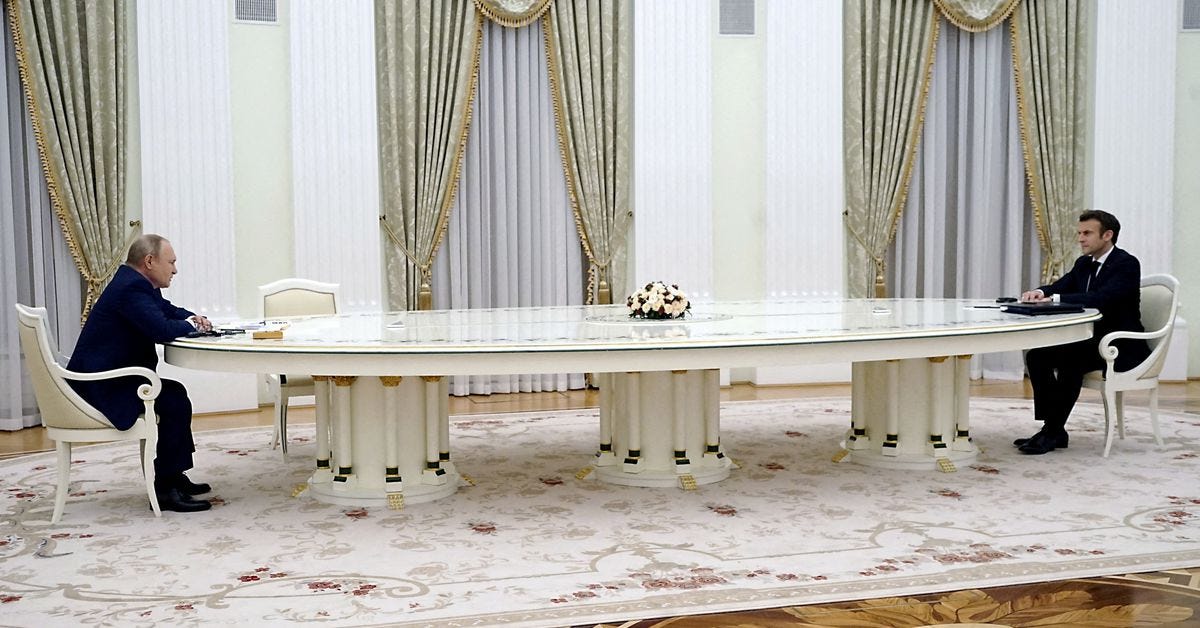





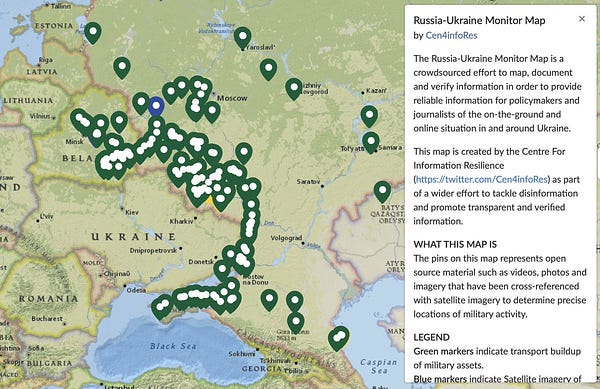




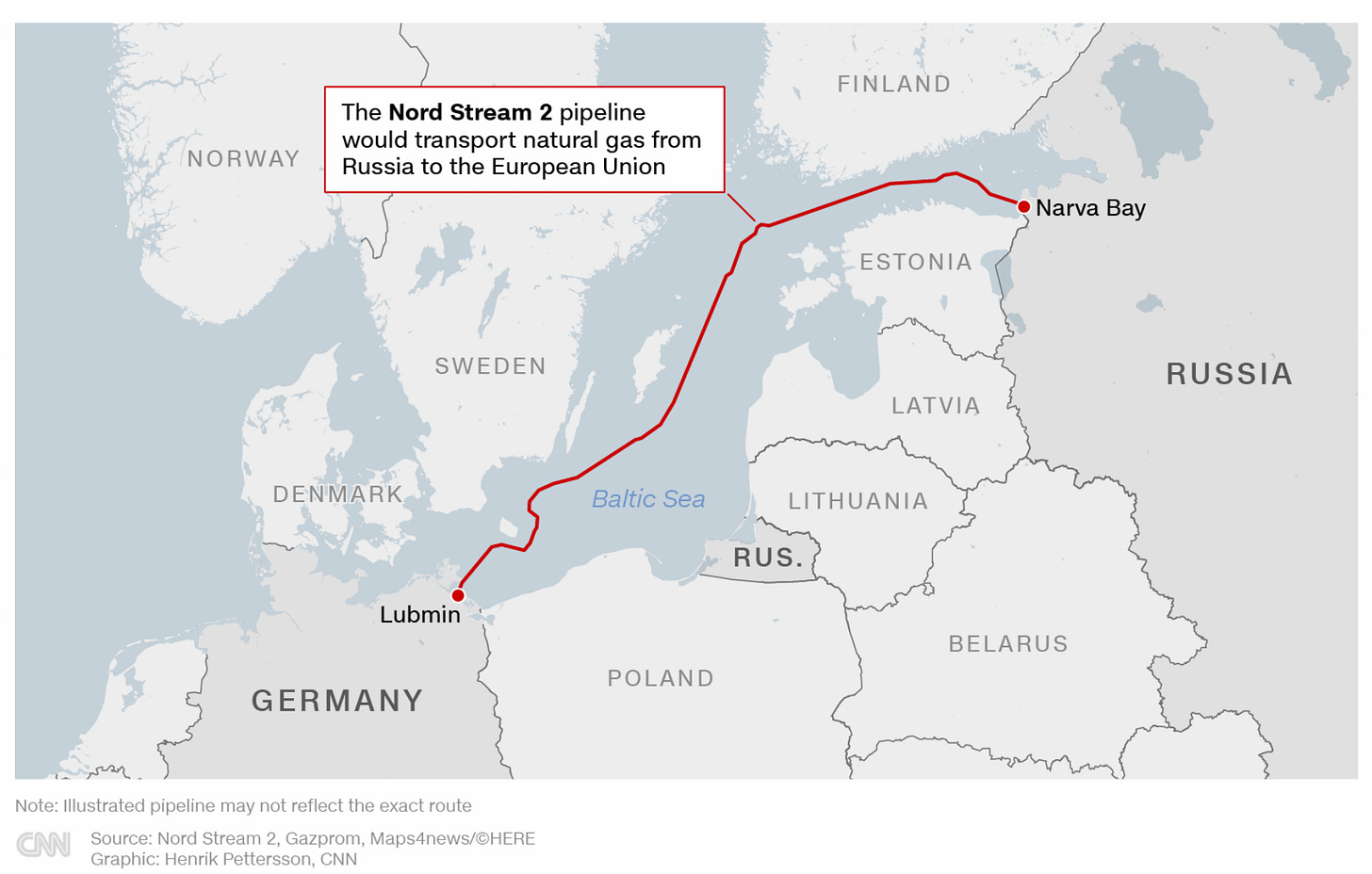


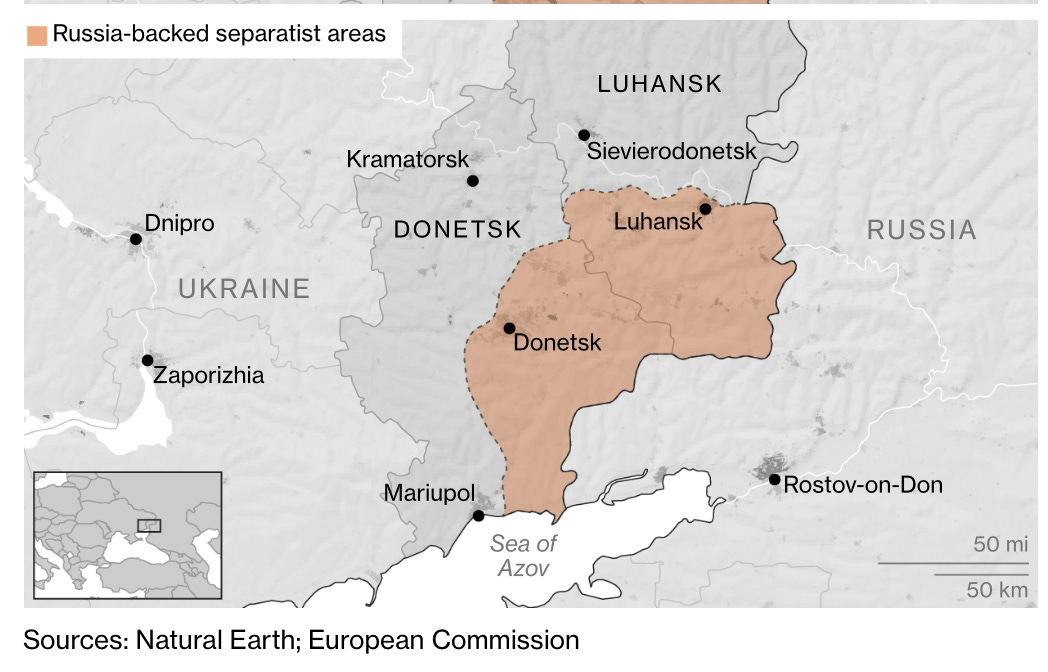
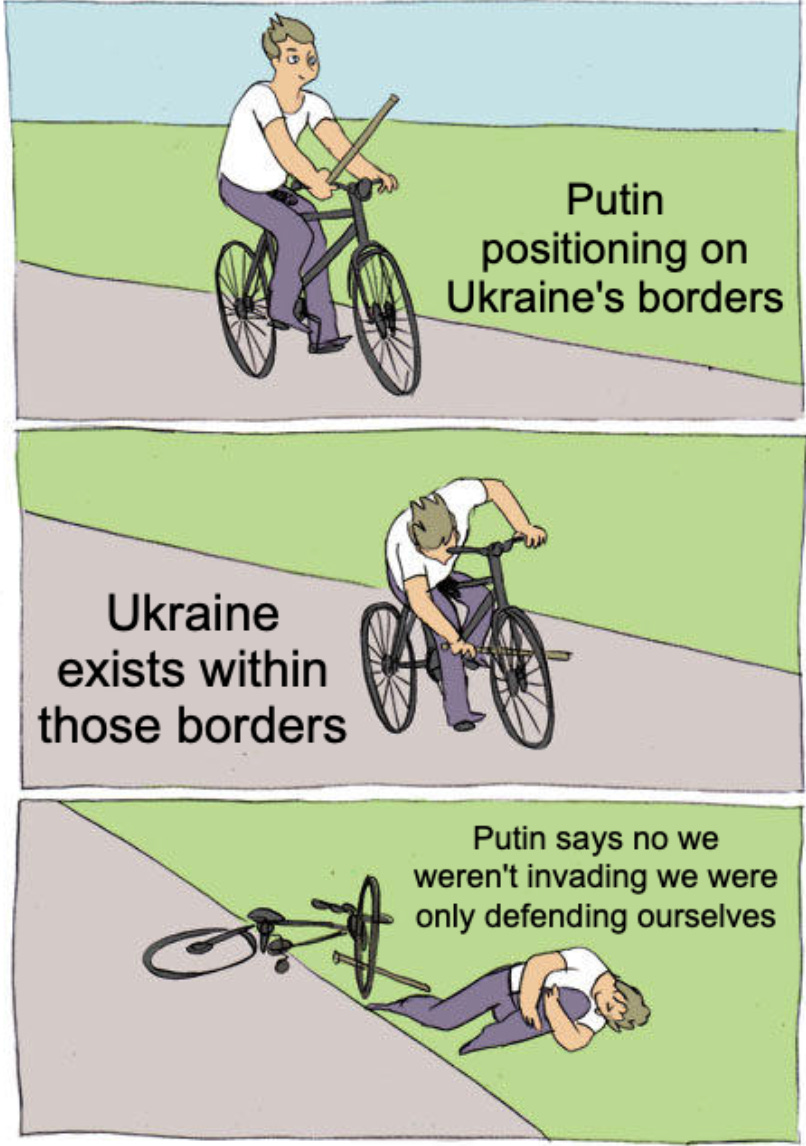

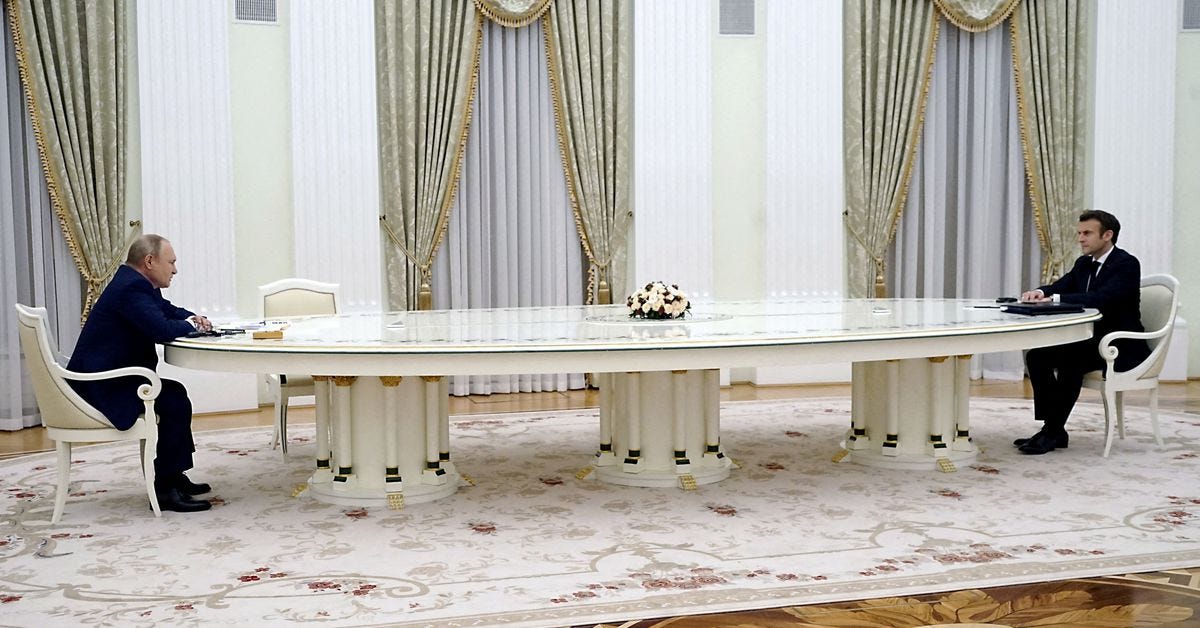
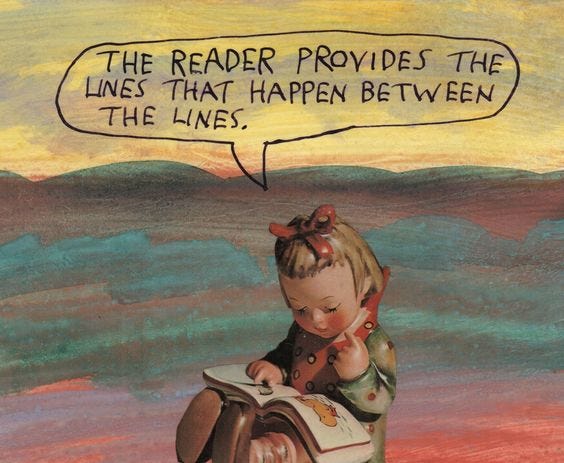
Putin "wants Ukraine back". where do you get this nonsense. You are obviously not reading transcripts from his own speeches. Putiin is very very clear on his motivations Your still living in Washington misinformation bubble.
Thanks a lot Kyla !